#but didn't really know how to word it
Explore tagged Tumblr posts
Text
Do you ever think about how when Renarin stopped wearing glasses in wor, Dalinar assumed he had stopped because he wanted to look like a warrior? Do you ever think about how no one commented on this, so it wasn't unexpected to them? Do you ever think about if Renarin has done this before, not neccessarily with his glasses, but with meds, or other things he needs, just to look strong to the Alethi? Do you ever think about renarin
#i have had this post in my head for months#but didn't really know how to word it#i know it's a stretch#but it makes sense#kinda#renarin#renarin kholin#dalinar kholin#alethi#stormlight#the stormlight archive#stormlight archive#wor#words of radiance
561 notes
·
View notes
Text
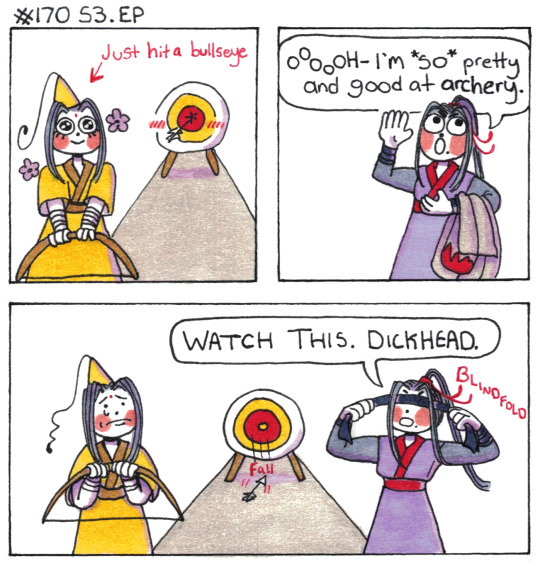
Archery Nemesis.
[First] Prev <–-> Next
#poorly drawn mdzs#mdzs#jin zixuan#wei wuxian#(Trying to not break my own continuity by showing WWX changing outfits in the middle of a comic...I'm doing my best...)#The original line for the third panel was just 'fuck you' which admittedly is a funnier line.#Wei Wuxian really does call JZX a little pretty boy (not in those words but close enough) and then dramatically one-ups him...#Not only that; he tries to use Lan Wangji's headband as a blindfold. Which I think we need to take a moment to analyze.#It's probably easiest to look at this as ship-tease but I think it's far more in line with how WWX's mask is slipping.#He knows full well how poorly touching LWJ's headband went in the past.#But somehow - in this moment of his anger being targeted at JZX - that crucial information is forgotten.#He's got tunnel vision over something so small...and what do we know about emotions that don't suit the supposed cause?#Why that would be displacement. Something is bothering him and it sure is *not* just Jin Zixuan's fancy ass.#WWX came back but he didn't come back the same. It's rather unsettling how it feels like he's putting on a performance of himself here.
2K notes
·
View notes
Text
Actual Ultimate Classpecting Guide
For real this time.
Buckle up, this is a really long one. For everything that's posited, I can provide textual evidence; that being said, I'm not going to be including the textual evidence within the essay itself, because it's already long enough as-is. As such, please feel free to ask for clarification or sources on any assertion, and I'll do my best to provide.
Before we begin, there's some things to discuss about how we're going to be approaching classpect in the following essay. In numbered list form for our short attention spans:
1. There is a concept Hussie talks about multiple times in his book commentary, "personality alchemy" - the idea that there are these "platonic ideals" of certain characters, which can be mixed and matched with others, in order to create new characters. The examples he gives are of how Eridan was a proto-Caliborn, how Kanaya has shades of Jade, how Nepeta was a proto-Calliope, and how Sollux and Eridan have shades of Dave in them. Classpecting is fundamentally a form of this personality alchemy:
2. Class describes the character's arc and emotional hurdles, while Aspect describes the character's base personality traits by which this arc is experienced.
3. For example, all three Seers struggle with hubris: Rose's need to be the smartest person in the room led to her being manipulated by Doc Scratch, Terezi's obsession with meting justice led to her engineering a situation where the only option was to kill Vriska, and Kankri's desire to be seen as a spiritual leader amongst his friends led to him furthering their divisions and harming them.
Then, when their pride is shattered, they cope by inflicting willful self-blindness: Rose turns to drinking herself stupid (the opposite of Light's sway over knowledge), Terezi gets down with the clown (the opposite of meting out Mind's justice, as it's a Gamzee W), Kankri goes celibate (Blood L) despite his clear romantic feelings for certain teammates.
4. As for Aspect: note how all three Life players share the personality traits of optimism, stubbornness, and obstinacy. All three Breath players share an immaturity and naïvety, and are quite frankly irresistible to people for some reason. All three Light players share a need for the spotlight and a tendency toward long-windedness and persnicketiness. So on and so forth.
What's interesting is, if you start analyzing characters that share Classes and Aspects, these specific types of similarity crop up over and over - all our Knights struggle with insecurities and facades, both our Bards have a crisis of faith. All three Breath players have an aspect of immaturity and childishness to their characters, and all three Light players are deeply concerned with appearing intelligent and feeling important.
5. As a result, this guide is NOT intended for classpecting real life people, because we are complicated, we contain multitudes, and we don't have arcs. This is primarily an analysis of what Class and Aspect mean in Homestuck based on textual evidence, because I genuinely believe that you can basically figure it out if you read carefully.
6. Duality, and the idea of "equal and opposite," are major themes within Homestuck - Prospit and Derse, Skaia (described as a crucible of birth and creativity) and the Furthest Ring (the literal afterlife). Which classes are involved in an Active/Passive split, and opposing Aspects, are the same way. This is the primary method I used to determine the Active/Passive pairings and opposing Aspects. After all, as Callie describes, both Thieves and Rogues are classes "who steal" - so, too, do I try to unify Classes by a common theme, even if they diverge wildly in how that theme is expressed (as Thieves and Rogues do). In the same way as the opposite of "up" is not "apple," but "down", because "up" and "down" are both fundamentally concerned with relative vertical position, so too can be defined concepts like Breath and Blood, Hope and Rage, Light and Void - as well as the reasoning behind Class pairings like Heir and Page, Maid and Knight, and Seer and Mage.
7. Descriptions for both Class and Aspect are left deliberately vague and up to interpretation within the comic itself, and this is by design: the actual manifestations of an Aspect can vary wildly given the Class, and even individual person, that it's tied to. Calliope even makes note of the fact that, under the right circumstances, someone can manifest effects that appear to be the opposite of their aspect. She's also careful to couch her language in "may" and "can" - because these concepts are intentionally somewhat nebulous and malleable. As such, while this guide certainly lays down what can be gleaned and inferred from the text, do note that Homestuck runs on a soft magic system, and as such, nothing stated is firm, 100%, must-always-be-this-way - just an overview of what we've seen.
8. There is often great overlap between Aspects, Classes, and Classpects - which Calliope herself notes. Heart and Blood are one of the most salient, as they both have a fixation on relationships, and Calliope mentions that under the right circumstances, a Classpect may even be able to manifest what appears to be the opposite of their Aspect. Again, Homestuck operates on a soft magic system, so this is a feature, not a bug.
ASPECT
There's a little less to say about Aspect, not because it's less complicated, but because "base personality traits" are much more nebulous compared to Class's sway over character arc. Still, Aspect represents the fundamental way a character is, and thus, color every interaction that character has. There's a reason Ultimate Selfhood is sought through Aspect, not Class - Aspect is the core of the character's being, what makes that person that person.
That all being said, Class has major sway over how an Aspect manifests, and certain classes can even invert the Aspect and even the character's role in the party. As such, these descriptions must be parsed carefully in relation to Class. Moreover, due to the soft magic system, there is at times overlap between unrelated Aspects, which can also be exacerbated by Class - Heart and Blood being the most obvious in this regard. Still, overall, you'll find the Aspects to be fairly distinct from one another.
Please also note that every Aspect can deal with its literal counterpart by default - Light players can wield lasers, Breath players can wield the breeze, et cetera. Because this kind of goes without saying, and because the non-literal stuff is more interesting to discuss, I'm not really going to go into too much detail about the literal qualities.
Finally, something interesting to note is that nearly every Aspect follows its own Hero's Journey cycle - full actualization for each one usually means reaching around to its opposite Aspect, and taking lessons from them - for example, Breath players need to learn maturity and responsibility, while Blood players need to learn relaxation and whimsy. Thus, an Aspect at its worst manifests in two ways - either a toxic overabundance of the Aspect's worst traits, or such a dearth of the aspect that it begins to resemble its opposite. Only by reaching into the opposite, however, can the player be tempered and reach full maturity - can they become more of who they are.
SPACE / TIME
Space and Time are both concerned with physical reality, goals, and the way one approaches them.
Space is associated with "the big picture" - with recycling, reproduction, and the interconnectivity of all things. The aspect also presides over the enjoyment of the journey over the destination - Space players serve as reminders that the present moment is as important as the end goal. Space is often a more passive Aspect, being the stage upon which the story is set. They're the hosts of the party, and the one who marks the ending.
Its players reflect these tendencies, often being feminine, with penchants for life-giving acts such as gardening. Their personalities tend towards frivolity and silliness, finding it difficult to stay on-topic or bring full gravitas to serious situations. Perhaps a better word would be "distractable;" when the aspect is so concerned with all things in connection with each other, it's easy to lose track of details, and it's easy to enjoy things simply as they come. Space players tend to be kind, patient, and forgiving, which is a strength as much as it is a flaw; it's easy for malicious actors to take advantage of this compassion, or for the Space player to find themselves in a poor situation by being overly permissive. They can easily be painted over by stronger personalities, and tend to struggle with romantic relationships, as they attract many with their kind and giving natures, and few are naturally so considerate of the Space player in turn.
"Passive" is a good word to use; at a toxic overabundance of their Aspect, Space players are trampled underfoot. They become enablers, servants to dark forces, or so lost in their own worlds that they neglect the one they live in. With their Aspect "inverted," a Space player becomes a demon of poor prioritization. Distracting not just themselves from their true purpose, but others, too, the Space player will wreak havoc by overemphasizing unimportant topics and ignoring important tasks. This superficially resembles Time, in that the Space player will become fanatically dedicated to their task, but note that the poor prioritization is still Space-esque at its core.
Still, within this nadir is a valuable lesson: the strength of self-assertion, and the determination to see a goal through. These will allow the Space player to weed their garden, separating good from bad, allowing it to flourish like never before.
Time, in contrast, is associated with "the little things" - with details, minutiae, and processes. Time presides over the struggle toward something greater, the endurance of hardship with an eye on the prize - the destination over the journey. Time players are the ones keeping track of the tasklist, marking off each item as it reaches completion; they are the tireless workers keeping the whole engine running.
Time players, thus, are ones whose lives are marked by struggle. They are highly goal-oriented; in contrast to how Space players can easily move from goal to goal, task to task, Time players feel bound to see things through to the end, finding satisfaction only when they've achieved their desired result - and only until they come across the next goal in their journey. A Time player isn't happy without a goal to work towards, a craft to polish, a prize to win - but this driven nature can easily be its own downfall, as it leaves little room for the player to admit to their own shortcomings, or ask for help from others. Moreover, their focus on minutiae can leave them blinded to the bigger picture, and it's easy for a time player to fall to despair, able to do nothing more but spin their wheels. They're prone to directionless anguish, frustration, and resentment towards the seeming futility of their actions, becoming destructive and defiant even when it doesn't serve them to do so.
At a toxic overabundance of their Aspect, Time players become explosively destructive. The ultimate "goal" of all things is death, with which Time is associated, and accordingly, Time players have a penchant for aligning themselves with futility and entropy, struggling so hard that their thrashing leaves a trail of annihilation in their wake. With their Aspect "inverted," Time players detach entirely - they can become so fed up with struggle that they simply opt to lay their weapons down and let the end take them. It's very easy for them to come to the conclusions that either everything matters, or nothing matters. This superficially resembles Space and its big picture thinking, but note that its framework of struggle, and whether or not a goal needs to be pursued, makes it a Time concern.
But the inherent meaninglessness of existence is, in itself, an important realization to make - that whether or not anything "matters" in the grand scheme, things can still be worth doing, worth caring about, and worth investing in. This realization allows the Time player to attack their goals with renewed vigor and greater clarity, which in turn means that the party becomes an efficient, well-oiled machine.
BREATH / BLOOD
Breath and Blood are both concerned with directionality, interpersonal relationships, and autonomy.
Breath is the Aspect governing freedom, liberty, and independence; it is a force that breaks shackles, clears out social norms, and refutes "the rules," whatever those rules may be. Breath players can't be tied down, whether by physical bonds, societal rules, or even the ineffable forces of the narrative itself. They are leaders of example, pioneers, and trailblazers, opening new paths for their teammates to follow.
Breath players are goofy and gullible, often with hearts full of childlike whimsy, naivety, and even immaturity. They are friendly and well-meaning, fond of simpler things, and easily swayed by others. They approach the world with a sincere and innocent good-naturedness, like a baby animal before it learns to be fearful of danger. Something about this sincerity seems to make Breath players irresistible to others, and they often find themselves the subject of romantic attraction. However, in this childishness is also the great pitfall of many Breath players - their natures are naturally conflict-averse, and egotistical the way a child can be, failing to see beyond themselves. They can be incredibly callous when not considering the consequences of their actions, or the viewpoints of others.
At their worst, Breath players are irresponsible and callous. They'll shirk the consequences of their actions, blaming anybody but themselves, or simply choose not to care who they hurt in order to get what they want. They may even choose to stop making choices for themselves, leading to the "inversion" of their Aspect - a voluntary loss of freedom and independence, derived from an Breath-like aversion to responsibility, which superficially resembles the bondage of Blood.
But if they are able to overcome these tendencies, a Breath player will learn what true responsibility looks like - responsibility for themselves, their choices, and the effect they have on others. Armed with this, a Breath player's ability to break bonds can be focused into a clear force for good, clearing away all obstacles and harmful societal standards, leading the charge into something new and beautiful.
Blood, in sharp contrast, is the aspect that governs bondage, contracts, and interdependence. It is a force that binds. Under Blood's sway are not only romantic entanglements, but familial, friendly, and societal ones as well. This aspect sees overlap with Heart, but the division is this: Heart concerns itself with feelings, and Blood concerns itself with compatibility. Blood players are diplomats, forces that remind us all that we are more similar than we are different, and that that similarity should bring us together when we are on the verge of pulling apart.
Blood players, reflective of their Aspect's association with bonds, tend to be neurotic and obsessive. They have a tendency to over-examine and overthink, constantly fretting over the infinite and infinitesimal variables that influence the shape of society and interpersonal relationships. However, this judgmental nature stems from a deep well of idealism and empathy; Blood players can't help but care about others and wish for the best for them. In a way, this makes them one of the most mature members of the team, being concerned with its overall well-being. Unfortunately, their prowess does not extend inwards, and their assessment of themselves is usually direly incorrect - all the worse because Blood players always feel responsible for those around them. Blood, being the Aspect concerned with interdependence, is the weakest one when all alone.
Thus, it's easy for the Blood player to wind up controlling - desperate to make sure everyone is moving according to their vision, they'll become iron-fisted dictators, with a "my way or the highway" approach to social interactions. It's easy for them to wind up pariahs of their own making, becoming so critical of others, or so adamant about enforcing their own will, that they inadvertantly sever their ties - something that superficially resembles Breath's independence, but is truly a result of Blood's neuroticism.
But with that space and separation can come great clarity. Blood players must learn to relax their grip, and allow people room to breathe - including themselves. Once able to grasp that sometimes bonds must be forged with a soft touch, Blood players' natural empathy shines through, allowing them to build something so much kinder and greater than the sum of its parts.
LIGHT / VOID
Light and Void are both concerned with knowledge, ontology, and "narrative relevance".
Light (as well as its counterpart) are perhaps best understood through the lens of "narrative" - this idea that, of all things that do and don't exist, and all events that do and don't happen, only the ones put to page are "relevant". Thus, Light is associated with knowledge and luck - that is to say, it's associated with the knowable, the objective, and the concrete, and the ability to determine "important" events. Light players have read the book they're participating in, and able to serve as luminary guides from one plot point to another, lighting the lampposts for others to follow.
Light players, naturally, are erudite and educated, possessing keen intellects and cunning minds. They are fond of knowledge itself, of markers of status and prestige - whether that's wealth, the adulation of the masses, or a massive library. They harbor a desire to be important, to be seen, to be acknowledged, and are happiest when they are looked up to. Conversely, they deal poorly with being looked down upon. Their confidence transmutes easily into hubris, and they struggle with having that pride challenged. As such, they tend to be volatile and unpredictable, quick to retaliate against those who threaten their egos, or obsequious to those whose acknowledgement they desire.
Their desire for the limelight can quickly spell disaster - they can become incredibly cruel, harsh, and egotistical in their pursuit of narrative significance. They forget, in their obsession, that they, too, are fallible and flawed, and the inevitable reminder can come very harshly. Light players struggle with moderation, and as such, when they feel shame, they'll often take drastic measures to cope with it - deliberately darkening their own influence or intellects, removing themselves from the "story" entirely - something which superficially resembles Void's penchant for the background, but which is firmly rooted in Light's obsessive need for drama.
But in experimenting with narrative insignificance, Light players can reach an epiphany - in their absence, others may shine, and that can be a wonderful thing. Light players, then, can learn to shine not just for their own sakes, but for the sake of others, allowing them to weave a story even more brilliant than any that can be weaved alone.
Void, in contrast, is the blank spaces between the words. That which is secret, subjective, unknowable - these are Void's domain. It's associated with taboos and hidden things, sexuality and pleasure. It's also associated with the empty canvas - the blank space before creation, and the oblivion to which creation is eventually destined for. Thus, it stands for infinite possibility, though the collapse of those possibilities into a reality removes that reality from Void's domain.
Thus are Void players ever cosigned to the background, though this generally suits them fine. Void players are very self-possessed. Where Light players tend to exaggerate and complicate, Void players are honest and simple, preferring straightforward solutions. They don't tend to think very hard, instead letting intuition and emotion guide them to where they want to be - which makes them one of the more stable personalities on a team. However, this simplistic, feelings-driven approach often leads to pleasure-seeking behavior, poor impulse control, and overindulgence in vice, and from there, to irrelevance, with which Void is so closely interlinked.
Void players are especially prone to vice, and at their worst, will become so drunk on pleasurable activities that they pursue them to the active detriment of the party's goals or the Void player's self-improvement - making them the ultimate irrelevant character. They can also very easily drag others into their mélange, with a forcefulness that resembles Light's illuminating guidance, but which is ultimately rooted in Void's pursuit of personal pleasure.
But there's a lesson to be learned in Light's domain: how to bring themselves into relevance and greatness. A Void player, once they learn to pursue not just personal pleasure, but a greater satisfaction for the collective whole, can drag the Void behind them, kicking and screaming, to where it'll be of use.
MIND / HEART
Mind and Heart are concerned with what it means to be a sentient being, with identity, and with why we do what we do.
Mind is the Aspect associated with logic, rationality, karma, ethics, and justice. To a Mind player, they "are" because they "think". They are keenly aware of the consequences of every action, and well-versed in cognition and behavior, such to the point of manipulating others with ease. Deeply concerned with the "effect" of cause-and-effect, Mind players are always cognizant of debts and credits, where justice is owed and where it has been over-meted, and their subtle machinations culminate, like well-placed dominoes, in grand and explosive finales.
Mind players are schemers - it's in their nature. They have a tendency to view the world as a puzzle or game, with themselves and the people around them as pieces on a board, and set as their standard rules the laws of ethics and karma - owed debts and overhanging credit - guilty and innocent. Mind players are wickedly cunning, and have an high success rate with every scheme they commit themselves to, but the grand downfall of all these tendencies is that they tend to lack in a sense of identity, and have a poor grasp on their own emotions or desires. While they may know how to provoke a desired reaction, they don't know how to change someone's mind. They often find themselves grappling very painfully with their own selfhood, with feelings of emptiness, inadequacy, or uncertainty.
Thus, a Mind player at the worst zenith of their Aspect is heartless and cruel. Leaving no space for empathy or even personal feelings in their plans, the Mind player will plot for an ending as heartless as they are. But a Mind player is never truly without emotion, and ignoring their own feelings causes them to manifest in terrible ways - Mind players have a tendency to seek toxic, codependent relationships, hoping to find external validation, subjecting themselves to the wishes of others, which can appear like Heart's fixation on feelings and desire.
But in recognizing their own need for emotional validation, and the importance of their own feelings, a Mind player can realize that there's an entire dimension to the game they've been playing that they've been ignorant of. When a Mind player learns to temper their schemes with empathy, compassion, and kindness, how much more success they'll see - and how much happier that grand finale will be!
Heart, then, is associated with feelings, motivations, intuition, the soul, and the self. To a Heart player, they "are" because they "feel" like they are - and they're keenly aware of the multitudes that are contained within themselves. Deeply concerned with the "cause" of cause-and-effect, they're drawn to desires, those of themselves and of others, especially where strong feelings are concerned. Heart players are gifted with an intuitive understanding of those around them, both their good and bad qualities, and are tasked with the grand task of bringing out the best.
It stands to reason, then, that Heart players have a firm grasp on who they are and what they want. For the same reasons, it's difficult for a Heart player to truly hate or condemn another person, because they are so adept at understanding them. However, this understanding comes with a price - because the Heart player is so aware of themselves, they can't escape their own worst traits - nobody self-loathes as accurately as a Heart player can. Nor can they ever truly be untruthful with another, making them poor manipulators. Capable of presenting a different facet of themselves as the situation calls for it, certainly, but just as it's impossible to lie to a Heart player, who always knows how someone really feels, it's impossible for a Heart player to lie to themselves.
With this sincerity comes vulnerability. Heart players wear theirs on their sleeves, and at their worst, this can make them demanding, needy, and sensitive - so eager to connect with others emotionally that they'll cramp themselves to fit others' desires. But they can't ever keep this up for long; Heart players have a tendency to withdraw from others after being hurt too often, finding it easier to be alone and silent about their feelings than to deal with the pain of rejection. They may even work to manipulate others, preying on their emotions and desires to force them to act in their worst interests. This superficially resembles Mind's cold logic, but unlike Mind's cool rationality, Heart's aloofness is a mask, an attempt to avoid pain by pulling away.
But this isn't purely a negative, because a Heart player can learn a healthier form of detachment, and separate out healthy and helpful desires from harmful and detrimental ones. Given this clarity, the Heart player becomes the team's emotional core, able to raise up each teammate's best qualities, while helping them deal with their worst, enabling everyone to be the best possible version of themselves - which the Heart player knew them to be all along.
LIFE / DOOM
Life and Doom are concerned with outlook, with journeys, and with trials and tribulations.
Life is an aspect concerned with healing, growing, and improving. It is associated with beginnings, optimism, and positive emotions. The very essence of Life lies in its healing abilities, in this idea of overcoming the odds and triumphing over hardship and difficulty. Life is action, movement, and motion, and its players can scarcely hold still. Life will find a way - and Life players harbor the same immutable belief; they are the most stubborn weeds in the garden, the cockroach that survives the apocalypse, and the beating heart that refuses to stop.
Life players tend to be optimistic and confident. They are self-assured individuals, with a stubborn belief that good things are on their way, and any hardship they face is not only temporary, but something that can be overcome. They can find the silver lining in any cloud, and enjoy themselves under any circumstance. They love to nurture, to care for others, though this love has a tendency to be one-sided. Indeed, Life's stubborn nature is its players' greatest pitfall; their persistence easily becomes obstinacy, and their confidence can become condescension. Their self-assured nature easily becomes egotism, and they can have great difficulty grappling with those who don't share their views - even coming to oppose those who bring emotional pain and suffering that can't be easily fixed.
It's very easy for a Life player to decide another person isn't worth their attention, and opt to leave them behind - after all, Life has to move forward, no matter what it tramples in the process. At their worst, they're stubborn to the point of not listening to anyone but themselves, confidence becoming blockheadedness. This focus on forward progress without looking back can even cause Life players to become harmful to others, so focused they are on their own growth that they don't notice that they're choking everyone else out. This may resemble Doom's death in its worst case - arresting everything else, eventually blocking even their own path with unruly, out-of-control fecundity.
Thus, a Life player needs to learn to more gracefully accept Doom's influence - to pause, slow down, and consider viewpoints that are negative, unpleasant, or difficult. A Life player, endowed with moderation, will be able to cultivate a bountiful garden, rather than an unruly jungle - a place for all to flourish and live in plenty, never wanting for anything.
Doom, then, is the aspect concerned with death, with rest, and with endings. Doom is associated with suffering and with negative emotions, with peace, with sleep, and with dreams. Doom players have a natural penchant for prophecy, and are often dual dreamers, able to take advantage of both Skaia's oracular clouds and the Horrorterrors' voices over Derse. All things must eventually come to an end, and not all times will be good; in these troubling times, Doom players shine, as they are the guides who call the murk home, and know best how to navigate rough waters, course-correcting until the storm passes.
Doom players tend to be deeply pessimistic. They experience, to a much more magnified degree than others, negative feelings and impulses, and it's difficult for them to see the world without seeing its flaws, first and foremost. They are not healers, but commiserators, those who understand greatest that sometimes there's no way to deal with tragedy but to simply sit with it and wait for it to pass. The counterpoint to Life's insistence on breathless positivity, Doom is a reminder that pain, grief, sadness, shame, and guilt are not unnecessary things - in fact, excising them can lead to terrible consequences. Doom players are the universe's martyrs, often taking it upon themselves to course-correct, to sacrifice themselves in order to give others a chance to continue on, to avert a terrible fate.
Unfortunately, this tendency also brings with it a tendency for Doom players to wallow in misfortune, or worse, to take themselves out of the picture, giving up entirely on seeing a better ending. As if energized by their own sense of futility, a Doom player at the "inverse" of their aspect may seem to echo a Life player's focus on forward progress and motion, actively spurring their team on towards an untimely demise.
A Doom player must learn to harness this sense of progress for good, rather than harm. A Doom player, once able to grasp the joy of life even in the greatest depths of despair, will be able to fill even the darkest hours with peace, meaning, and hope.
HOPE / RAGE
Hope and Rage are concerned with permission, and are the lens by which we define reality.
Hope is described by Hussie in the book commentary as being "framed as the most powerful aspect" because it is, literally, an aspect that defines reality. Its specific ability is lies in reducing the "fakeness attribute" of something, thus making it "real". Hope is associated with convictions, with idealism, with faith, order, holiness, and, of course, with magic - which Hope turns real. Hope is permission itself - a reality-breaking ability to look at the world and decree that it must be another way, a way in which the Hope player believes it ought to be.
Thus, Hope players tend to be hard-headed zealots, with no self-awareness whatsoever. Their inclination towards powerful beliefs makes them very difficult to dissuade from a path they've set their minds to, and their specific suite of abilities makes them terrifyingly likely to make their vision come true. Hope players are usually not particularly cunning, nor particularly intelligent, nor even particularly empathetic. Given the Aspect's focus on conviction and faith, it's usually very difficult for Hope players to notice anything occurring beyond their own minds and feelings. Thus are Hope players hopeless optimists, hopeless romantics, and hopeless in general - often great sources of embarrassment to their teams, as their naked sincerity is painful to witness. However, their ability to define reality does not leave them when their beliefs are faulty (which they often are, given Hope players are not particularly introspective, either), which is what makes a Hope player so dangerous.
A Hope player can easily be set on the wrong path - as convicted as they are, and as difficult to shake from that conviction as they can be, Hope players can easily march down a path of destruction, if not persuaded with a deft touch and gentle guidance. In the event that their faith is broken, Hope players easily become despondent and lost, floundering and wishy-washy, which superficially resembles Rage's self-consciousness, but is truly just a lack of direction.
But Rage has a powerful lesson to teach Hope players - that of questioning themselves, interrogating their own beliefs. Once their convictions have gone through rigorous scrutiny, revised into the best, brightest versions of themselves they can be, a Hope player is a worker of miracles - speaking into existence a beautiful future on faith alone, proclaiming that how they see the world is how the world shall be.
Rage, then, is the power of denial. If Hope reduces the "fakness" of a thing, then Rage reduces its "realness". Rage, too, is a means of defining reality, in this case taking a torch to the aspects of reality that it rejects. In more passive Classes, this works in subtler ways, stoking others towards destructive fury. Rage is associated with anarchy, chaos, revolution, destruction, anger, and nihilism. A Rage player will not suffer a world that does not satisfy them, breaking it to pieces, such that something new can take its place.
Therefore, Rage players are prone to harboring anger and resentment, discontentment with the status quo, and faith only in that what currently exists must somehow be dismantled. However, unlike Hope players, who can't help but be pathetically sincere, Rage players are incredibly self-conscious, and often try to mask and hide their embitterment and anger. This, ironically, leads to further ostracization, as others can tell they're being inauthentic. This only further compounds their sense of alienation, and drives them further into smoldering resentment. This makes Rage players sound volatile and dangerous, and they are - but the same fury that moves them is the fury that ignites revolts and tears down oppressive regimes, a necessary and vital well of energy and momentum. It takes careful handling to ensure that the team's Rage player can channel this energy towards righteous causes, rather than marking all as a target for their destructive ire.
In the worst-case scenario, the Rage player turns that rage out indiscriminately, deciding that there is nothing worth fighting for - only unpleasant things to be brought to ruin. This is Rage at its toxic overabundance. Conversely, a Rage player can retreat so harshly into their mask that they allow others to dictate their beliefs, taking them to heart - an action motivated by Rage's destruction (this time, turned inwards) that superficially resembles Hope's convictions and faith.
The true path for a Rage player is a healthy balance - to allow themselves some of Hope's sincerity, and by doing so, to become more sincere and true. This will let them release the pressure of their mounting ire, such that it can be converted into productive, rather than destructive, energy - the heralds of a revolution, razing away the faulty, corrupt old systems such that something better and new can take their place.
CLASS
As previously stated, Class governs a character's character arc - the character's starting circumstances, whether their conflict is primarily internal or external, and what major aspect of their Aspect becomes a hurdle for them to overcome.
In the same way an Aspect's sways tie into the character's base personality, the character's Class abilities tie into the kinds of struggles they face, and have great influence on how their Aspects manifest.
That being said, a character - and their Class - are always subject to their Aspect, as their Aspect is tied fundamentally into who they are. Thus, it can be said that a Light player will always have an affinity for knowledge and provide Seer-esque guidance even when not in a Seer role, a Doom player will always have prophetic abilities even with a non-prophetic class (note that Mituna, an Heir, still had prophetic visions, despite those generally being the realm of Mages and Seers), and a Life player will always have a penchant for healing, even paired with a destructive Class like Prince or Thief (the Condesce, after all, could still extend life; a Prince of Life would likely manifest not as one who causes plants to wither and die (this would actually suit a Prince of Doom), but one who destroys in the way of nature overtaking an abandoned shack, or a forest breaking down a body).
This means that when a character's Classpect inverts their Aspect, it doesn't mean that they suddenly become a hero of the opposing Aspect - rather, it means that, at their very worst - at the nadirs of their character arcs - they will lean so much into their Aspect's worst traits that it will superficially appear as the opposite, when all it really is is an absence of themselves. Dave, a Time player, usually so attentive to detail (despite his disaffected facade, he's always paying rapt attention to Karkat's rants, and noticing all the clues pointing to his destiny of defeating LE), at his lowest emotional point (arguing with Grimbark Jade after sobbing about his lost childhood whimsy), states that he doesn't think Lord English is that big a deal, and never even did anything directly bad to him or his friends - when he was literally directly haunted by LE via Cal his entire childhood. Similarly, Rose drinks herself stupid in order to cope with her mother's death.
Note how, superficially, this almost appears to be an invocation of Space's "big picture thinking," its passivity and permissibility, or how Rose's case appears to be Void's tendency to indulge in vices and pleasure - but they're not. Time's worst traits superficially resemble Space, Light's resemble Void, and vice versa - Grimbark Jade is the Condesce's taskmaster, and Porrim at her worst was as much of a nag as Kankri, trying to do a Time player's managerial job. Horuss and Equius at their worst won't shut up and won't stop talking over their partners. So on and so forth.
Finally, Calliope tells us a couple things about Active/Passive pairings. The first is that Calliope introduces the idea of paired classes with the idea that both Rogues and Thieves "steal" (and later, that both Princes and Bards "destroy"). This presents the idea that both classes can be roughly summed up with the idea that every pairing can be summed up with a common theme.
The second is her description of what makes a Class Active versus Passive - that Active Classes move their Aspect to benefit themselves, whereas Passive Classes allow their Aspect to be moved in order for others to benefit. In a way, they're like active and passive voice in grammar (to tie in with the way Classes and Aspects are so tied to ideas of narrative and character arc) - an Active Class performs their Aspect, and a Passive Class allows the Aspect to be performed "by others" (the famous piece of advice regarding telling the two apart being that a sentence written in passive voice can have "by zombies" tacked to the end of it - eg, John is attacked "by zombies", as compared to active voice - John attacks).
Thus, the Class pairings, along with their basic themes, are as follows:
KNIGHT - / MAID +
"One who controls."
Knights and Maids are paired together through two key factors: the first is that they both hold leadership or managerial roles; the second is that both classes carry the connotation of serving a Lord. Fittingly, they are both struggle with the control of malicious forces - Knights with prophecies indicating their role as heroes, Maids with direct usurpation by malicious forces.
PAGE - / HEIR +
"One who inherits."
Pages and Heirs are paired together because they both fundamentally deal with the great inheritances placed before them. Pages can come into incredible, limitless power - but they must struggle and work hard for it; Heirs begin the game in societal comfort and wealth, and must learn to defect from their decadence.
THIEF - / ROGUE +
"One who steals."
Thieves and Rogues are highly adaptable, as Thieves are capable of fantastic on-the-fly adaptation, whereas Rogues have an infinite toolbox at their disposal. They are both provocateurs, shakers of the status quo, though the Thief does so for personal gain, while the Rogue does so to right injustice.
MAGE - / SEER +
"One who guides."
Mages and Seers are tied together by the gift of prophecy and future sight. Seers are privy to the endless branching paths that the future may take, while Mages are gifted with the ability to outright determine a future that will certainly happen, appearing to be prophecy.
WITCH - / SYLPH +
"One who changes."
Witches and Sylphs are individuals blessed with great magic, but poor judgement. Sylphs heal and nurture, but are drawn to those with strong desires, and enable them to cause great harm; Witches, meanwhile, possess strong emotions, which they often use as moral guidance, for better or worse.
PRINCE - / BARD +
"One who destroys."
Princes and Bards are representatives of society - the one who determines its course, and the one who recounts its passing. Princes suffer from a toxic overabundance of Aspect, and are prone to spectacular meltdowns, whereas Bards are always poised for a crisis of faith. Both are responsible for catastrophic failures - but also breathless victories.
INDIVIDUAL CLASSES
KNIGHT
"One who controls [Aspect] or controls using [Aspect]."
Knights are frontline warriors, rallying points behind which the party falls into line. Although they are often leaders, just as often, they are logistical planners, strategists, or simply the team's beating heart. They are almost always thrust into positions of narrative significance, often carrying grand destinies or even outright heroic prophecies on their shoulders. The are the party's rallying force, its center, and a guiding light - the one to lead the charge, behind which the party will follow.
The primary character struggle a Knight will have is with crippling insecurity. Knights are prone to self-loathing and imposter syndrome, and will often adopt a façade in direct opposition to their aspect (ie, their fundamental personality) in order to cope with their feelings of inadequacy. Thus, their relationship with their aspect becomes love/hate - though they're naturally drawn to their aspect, and even naturally skilled at utilizing it, they have a tendency to become their own worst enemy, as their insecurities make them push their façades, and their façades distance them from their aspect.
"Controlling their Aspect" means that the Knight has easy access to their Aspect, wielding it like a tool or weapon - for good or for ill; "controlling using their Aspect" is what grants Knights their leadership abilities, able to dictate how others ought to act in accordance with the Knight's Aspect - whether their understanding of their Aspect is high or low, whether their advice is good or bad.
Therefore, at their worst, a Knight will fall prey to their insecurities, retreating into their facades, rejecting their Aspect, which will allow disharmony or misuse of it to proliferate throughout the team. They may even wind up deliberately twisting their Aspect's presence within the team so that they never have to be confronted by it; these distortions ripple outwards and eventually culminate in major catastrophes, all on account of the Knight's negligence.
But at their best, a Knight is a shining beacon and guiding light; when they come to terms with themselves, and allow themselves to be comfortable in their own skin - when they no longer allow themselves to be ruled by their insecurities and anxieties - they ensure that their aspect is harmonious wherever it appears throughout their party, and can wield it expertly as a weapon, as if it were their own flesh and blood.
MAID
"One who allows control through [Aspect] or allows [Aspect] to be controlled."
Unlike Knights, which take positions of frontline prominence, a Maid is a managerial presence in the backlines, though no less crucial for the smooth functioning of a party. Just as the invisible hands of the hired help keep a household running, the Maid will be called upon to provide vital services to keep the game stable, even if those services are more noticeable by their absence than their presence. Maids are often the party's unsung heroes or even shadow leaders, tugging at invisible strings, fingers on the pulse.
A Maid's primary character struggle will be that of escaping oppression. Maids tend to start the game in positions of subjugation or subservience, especially to malicious forces, and their abilities often end up being exploited to serve their masters' ends. Therefore, one may even have the impression that a Maid is ruled by their aspect, held prisoner and slave - at least until they're able turn the tables.
"Allowing their Aspect to be controlled" means that Maids are capable of directly dispensing their aspect unto others - a Maid of Time can dispense time unto foes, pausing them in their tracks; a Maid of Life can grant so much life that they can revive the dead. Their boons are great and direct, straightforward in a similar manner to Knights. "Allowing control through their Aspect" grants them their uncanny managerial abilities, as their aspect dictates the realm in which nothing occurs without the Maid's knowledge or permission, a realm made available to whomever the Maid's allegiance lies with.
Thus, at their worst, the Maid becomes a saboteur. Exploited by malign forces, their abilities to allow control over others through their aspect, or control of their aspect, makes them perfect vehicles by which their aspect can be hijacked or usurped, and made to turn against the party, and they often find themselves placed into these positions through no fault of their own. It takes the party banding together to shake off the forces that would keep a Maid in bondage.
However, at their best, Maids ensure that the party can never go too far off the rails. There is a place for everything, and everything will be in its place; a Maid is a supply line, a safe haven, and a promise that everything will be neat and tidy when the party returns from war. When the Maid belongs to themselves, their homestead becomes a fortress, and nothing occurs under the Maid's watchful eye without their express permission.
PAGE
"One who works to inherit [Aspect] or inherits [Aspect] for themselves."
Pages are a class defined by promise. As the name suggests, a Page begins weak, but has the great potential to develop into one of the most powerful players in the game. The exact nature of a Page's powers are vague, not because they are insignificant, but because they are so great that it's difficult to encompass them all. At the apex of their arcs, Pages are capable of miraculous feats, overpowering even Lords and Muses - if only they could reach that point and stay there.
A Page begins the game weakest of all, reflective of their long journey of growth. Where most classes only fall into deficit of their Aspect at their lowest emotional points, Pages begin their arcs in deficit - exhibiting character traits opposite to those their Aspect normally encompasses. Moreso than any other class, a Page must learn to grow into their Aspect. Weak-willed, naive, and easily hurt, Pages require careful nurturing if they're to come into their own.
"Working to inherit their Aspect" describes the endless journey of growth the Page must undertake - one with many missteps, backslides, and setbacks along the way. Still, they "inherit their aspect," meaning that their full potential, when realized, is overwhelmingly great - practically becoming their Aspect in humanoid form, capable of utilizing it to its glorious full potential.
However, their nature defeats them, and even if they can attain this state, the Page usually can't stay there for long. At their very worst, the Page's deficit of their Aspect's better qualities can turn the Page into a gravitic well of misfortune - an albatross about the party's neck, the centerpoint, if not inciting incident, of a massive disaster, as their team is sucked in by the Page's natural weakness.
But this is only true as it contrasts to a Page at their best - having grappled and won with the greatest of all weakness, a Page is poised to come into the greatest of all strength. Shown kindness, compassion, and support, a Page at full power reflects a party at their best. A Page at full strength is breathtaking to behold, an unstoppable force of nature, their Aspect made manifest.
HEIR
"One whom [Aspect] grants inheritance or inherits [Aspect] for others."
Heirs, in contrast to Pages, start the game strong. They usually belong to the upper echelons of their respective societies, a position of great wealth, leisure, and comfort, and are set to be inheritors of even greater wealth. Similarly, their Aspect comes to them as if of its own will - it is powerful, but difficult for the Heir to control, reflecting the wealth and status they've enjoyed as birthright.
An Heir's main challenge is that of examining their privilege, and learning where they wish to spread the gift they've been given. Because of their positions of sheltered comfort, Heirs are not particularly world-wise, and often harbor massive blind spots to the suffering of others and the ills of society. As such, they tend to be fairly aimless, given great power but no strong motivations, and have a tendency to simply indulge in their Aspect without contributing great help or hindrance to their team at all.
The Heir's Aspect is practically an independent entity. Being one whom "their Aspect grants them inheritance" refers to how the Heir starts powerful, able to summon their Aspect to perform great, miraculous acts. However, it is highly intuitive and difficult to control. The Heir's challenge lies not in attaining great power, but in attaining control over, and the ability to direct, their existing abilities. Once they do, they can "inherit their Aspect for others" - Heirs become a conduit through which their party can experience their Aspect, making it a usable pool of wealth for them all to draw from. However, because of their comfortable positions, many Heirs end up dallying, finding no pressing need to do so.
But this dallying hides a ticking clock. An Heir's inheritance will come to them, one way or another, and if they aren't ready to receive the great responsibilities that come with such great power, then the power will eventually consume them. An Heir with no clear direction will eventually become lost to their Aspect, entirely removing both from play. Like how wealthy inheritors simply become part of the status quo, so, too, does an Heir disappear into their Aspect, fixing it in place.
Thus, Heirs must learn where they have been blind, where they have been foolish, and what it means to be underprivileged. Then, once they turn their energies towards addressing those injustices - to taking responsibility for building a better future - when their wealth comes to them, they'll be able to distribute it where it's needed most. An Heir, fully-realized, brings their Aspect to heel, and makes it a resource available to their entire team, as if welcoming them all into the family.
THIEF
"One who steals [Aspect] or steals using [Aspect]."
Thieves are, as the name suggests, greedy - much of their arc revolves around a desire to amass wealth, though what's considered "wealth" varies based on the Thief and especially their Aspect. They tend to be callous people by nature, capable of ignoring or trampling over the feelings of others in order to take what they want, in the hopes of filling an emotional void the Thief may not even be fully aware of.
The Thief's playstyle is one of careful resource management. Reflecting a natural tendency to take "wealth" from others, Thieves are unable to use their Aspect without first "stealing" it - a subtractive act which leaves the victim bereft of the Aspect, weakening them in the process. Because of the finicky nature of these abilities, it takes great cunning to be a Thief, and the Class both demands and requires the player to be adaptable, flexible, and quick on their feet, able to effect complicated schemes and engineer the perfect situations for their powers to have the greatest effect. Thieves aren't necessarily strong, but they have a very high victory ratio, because they're experts at turning a situation to their own advantage.
"Stealing their Aspect" refers to the fundamental way in which the Thief class is played, this resource management game; "stealing using their Aspect" reflects how the Thief often becomes a malignant force within the party, viewing their own teammates as caches of wealth to plunder. Thieves are naturally prone to hurting others for their own purposes, craving drama and attention, and being of such callous dispositions that they're able to perform extreme acts of cruelty given the right motivations.
Thieves often become a target of ire within the party, disruptive forces whose quest for personal wealth and fulfillment comes at the cost of those around them. At their worst, they can bring so much heat down upon their own shoulders that the party feels the need to treat them like an enemy, which is disastrous for party harmony. Moreover, it's disastrous for the Thieves themselves, as Thieves seek wealth to compensate for some emotional emptiness, and making enemies of their friends only serves to deepen their ennui.
Thus, a Thief must be taught that true happiness and fulfillment doesn't come from the struggle for wealth, but from the building of something better with those they care about. A Thief, thus turned to heroic purposes, becomes the party's pinch hitter - an adaptable spy, an unpredictable maverick, an element of surprise - and above all, a reliable ally, capable of turning any tide in the party's favor.
ROGUE
"One who steals from [Aspect] or steals [Aspect] for others."
Rogues, on the other hand, call to mind such figures as Robin Hood, stealing from the rich to distribute to the poor. Rogues are at their best when they're agents of a well-planned heist, as they possess an unlimited toolbox - their own Aspect - to play with. Their Aspect is a treasure trove, just waiting for the Rogue to plunder it and share its riches - if only the Rogue can figure out how.
Rogues are forces of revolution. They naturally carry a rebellious spirit, one which bristles at injustice, takes a stand against authority, and questions the status quo. Their ideas are unfocused, however; they know they must rebel, but usually don't start with a clear idea of against who or what. They know that their society is injust, but they don't know how to address that injustice. They know there are villains, and may even know these villains' identity, but they don't know how best to defy them. In a similar way, they're often lost as to how to utilize their Aspect beyond its most basic applications, and usually require external assistance in order to bring out its full potential.
Rogues' true potential lies in "stealing from their Aspect" - an additive act, rather than a subtractive one, as a Thief's stealing is. Rogues are capable of removing their own Aspect's sway over another entity, allowing it to exhibit the characteristics of the opposite Aspect; a Rogue of Void can create things out of nothing, a Rogue of Heart can tease out behaviors and actions. They can also "steal their Aspect for others," allowing them access to their own Aspect's suite of abilities as well. This allows the Rogue incomparable flexibility, their abilities - like their dispositions - rebellious and subversive.
But their rebellious spirit, coupled with their lack of understanding as to who their real enemies are, is dangerous when left unchecked. Rogues often suffer from a failure to start, giving up on trying to understand the deeper implications of their abilities, and of the society they can't seem to find contentment in - but they can also suffer from a worse fate: rebellion without a cause. Rogues' free spirits can lead to them bucking the status quo in ways that actively harm others, performing acts of taboo or poor taste just because that rebellious energy needs to be put to use somewhere. These can have disastrous knock-on consequences, as some things are taboo for good reason.
Thus, Rogues need to be guided - to make connections with others, and come to a greater understanding of the world at large. Once they know their target, and what needs to be done, the Rogue makes sure there are no obstacles along the way - no safe is uncrackable, no prison inescapable, and no problem unsolvable, so long as the Rogue is there to work their magic.
MAGE
"One who guides [Aspect] or guides [Aspect] for themselves."
Mages are prophets, of the "always correct" variety - or so it seems. In actuality, Mages don't "predict" the future, they "choose" it - in a setting where the future is mutable, the Mage's ability is to speak into existence a future they desire, to tip the scales of causality and collapse possibilities into a single definite course. Their Aspect is the lens through which their "prophecy" occurs, a realm in which they command the fabric of reality itself.
As if to karmically balance this incredible power, Mages are afflicted by deep and terrible sadness. They start the game miserable, having been subjected to the greatest injustices their Aspect can offer, tormented by guilt, shame, and self-loathing. Their worldview has been shadowed with a lens of suffering and anguish, and so, too, is their view of the future. Mages usually begin the game having already set several prophecies into motion, and these early prophecies are usually obstacles that the party must overcome.
Mages "guide their Aspect" - this refers to the way their prophecies, that is, their chosen futures, always come true. Their visions may be limited to the sway of their Aspect, but it remains a powerful ability nonetheless. "Guiding their Aspect for themselves," then, outlines the Class's Active nature - the futures the Mage picks must be ones the Mage believes will come to pass.
Unfortunately, Mages have a tendency to pick ugly futures. This isn't out of malice or anger; this is because Mages start the game sad, and without intervention, grow sadder. They're prone to spirals of negativity, self-loathing, and depression, and as their outlook dims, so, too, do their forecasts. Mages suffer, but even suffering can grow familiar - can even appear comfortable or desirable, if the Mage suffers long enough. It's easy for them to grow so accustomed to misery that misery is the only outcome they can see - spelling doom for the rest of the party, one prediction at a time.
But a Mage whose party shows them kindness and forgiveness, compassion and empathy, can pull them out of their misery. How beautiful, then, the future appears! A Mage who believes in a brighter future is a force to be reckoned with. When a Mage can bring themselves to say, "and everyone lived happily ever after," you had better believe they did.
SEER
"One who who is guided by [Aspect] or guides [Aspect] for others."
Seers, meanwhile, are the true future-sighted, able to see the myriad paths the future could take. Like Mages, their Aspect serves as the lens by which their vision is colored; the Seer can sense, with fine accuracy, which paths are closest to the sway of their aspect, and which paths will take them further away. As if gifted with a guide to the game, their intuition is tied directly to the mechanics of SBURB, and they serve as the party's guides, a role indispensable in a game with so many moving parts.
Seers will struggle with blindness, first by hubris and ego, and then by self-harm. Seers begin the game quite full of themselves, proud of their prowess in their Aspect - usually arrogantly so. When this pride is inevitably shattered, Seers have a tendency to deal with their feelings of shame and guilt with willful, self-induced blindness - as if flipping a switch, they become ashamed of the pride they once placed in their Aspect, and seek to place as much distance between it and themselves as possible. There's comfort in ignorance, even if it renders the Seer useless.
Seers are "guided by their Aspect" - able to sense its presence, they gravitate toward it, and towards futures with it in abundance. And, in the same way, they "guide their Aspect for others," lighting the way for others down the path of greatest reward. Seers truly love their Aspect, no matter how much they may misplace their faith in it, and seeking it out is a great joy for them.
This is why a Seer at their worst is so tragic. By inducing intentional blindness within themselves, they are functionally deadening the strongest part of their soul. No matter the temporary relief this brings to the sharp, jagged pain of shame, it invariably deepens the Seer's suffering, as they deny themselves not only their own joy, but their ability to help others - another act which inherently delights them.
Thus, a Seer needs to be made to deal with their shattered ego head-on, to accept their own shortcomings, to become at ease with the idea that they don't have all the answers. Once their vision becomes clear, and their view becomes honest, the party nevermore has to fear becoming lost or straying from the path - the Seer will see to that.
WITCH
"One who changes [Aspect] or changes [Aspect] in others."
Witches are the winds of change, tweaking reality all around them until it suits their desires. A Witch is presence that commands both fear and respect, and their Aspect bows down before them, reduced to a mere minion in the Witch's presence, ready to attend to all their needs. In a way, the Witch's powers are straightforward - they can manipulate their Aspect as they desire, changing its qualities as they see fit. "How they see fit," then, is where the issue lies.
Witches are usually of "outsider" status, never truly being part of the society from which the rest of the party descends. Free from the same rules and common sense that govern the others on their team, Witches instead operate on a value system heavily reliant on their own emotions. What a Witch deems to be correct, to be true, or to be righteous, are often based not in any objective measure, but in subjective, emotional bias - and they're emotional creatures, indeed. Prone to fits of great anger, Witches can be benevolent one second and malicious the next, and their abilities let them imprint, to a greater degree than any other Class, their desires onto the world that comes after them.
Witches "change their Aspect," as in, the crux of their abilities lies in manipulating the qualities of their Aspect in their surroundings - extending, shortening, magnifying, shrinking, growing, removing… so on and so forth. It's a fearsome power. They also "change their Aspect for themselves" - their Aspect is hapless but to obey their desires; Witches change the world to suit themselves, and their feelings of how things "should" be often become how things "are" in short order.
Thus, a Witch who has been swayed toward evil entities and nefarious ends is a truly dangerous opponent - and it is unfortunately easy for this to happen. Witches' social isolation means they tend to trust their emotions, and a force that flatters these emotions can easily win a Witch's trust. By the same token, those that fail to flatter the Witch are often considered enemies, even if they're benevolent forces. A Witch's morality can thus become warped and topsy-turvy, which has grave consequences for the world that the Witch then shapes.
Therefore, a Witch's struggle lies in learning to see beyond their own emotions, to take in the opinions and assistance of others even when it seems superficially unpleasant, to move beyond the childlike rejection of that which is uncomfortable. Once able to see a more nuanced form of right and wrong, once able to tell evil from good, Witches can build even utopia.
SYLPH
"One who allows [Aspect] to change others or changes [Aspect] for others."
Sylphs are nurturers and healers; they bring to mind fey folk whose very footsteps cause plants to grow. Wherever they go, whatever they touch, all becomes suffused with the Sylph's Aspect, which flourishes under their careful cultivation. Sylphs adore their Aspect, and their Aspect adores them; Sylphs generally feel at peace with themselves, surrounding themselves with what they like.
A Sylph's main challenge - or rather, the main challenge that Sylphs wind up posing the rest of the party - is that Sylphs are enablers. They're attracted to those with strong wills and extreme dispositions, amused by the havoc they wreak and pleased by their attention. Sylphs love to pick out favorites and lavish them with care and attention, excusing any wrongdoing on their behalf and shielding them from consequences. At the same time, those who don't strike the Sylph's capricious fancy find themselves discarded in the Sylph's mind, shut out from the boons the Sylph can provide.
A Sylph is "one who allows their Aspect to change others" - this almost always manifests as healing, as it's an additive ability (that is to say, the Sylph can grant more of their Aspect to someone). "Changing their Aspect for others," on the other hand, explains this enabling nature of theirs - the Sylph will intervene to make the world into a playground for their favored individuals, even to the point of turning other, less "interesting" teammates into playthings for the Sylph's beloved.
Thus, while the Sylph themself isn't particularly prone to wild mood swings and acts of malice, their influence can still cause disaster by allowing unscrupulous individuals to flourish - even encouraging their worst tendencies. A Sylph's touch is subtle, but that subtlety only lends it an insidious quality, as the Sylph quietly works against the good of the many for the cruel, selfish pleasures of the few. At their very worst, the Sylph can deem themselves their only favorite, and render everyone else a minor character in their one-man show.
Thus, Sylphs must be challenged. They must be made to reckon with the fact that favorable treatment is not necessarily kindness, and that bias can easily become harm. When a Sylph is able to grasp the difference between bias and doing good, and tune their approach toward that greater good, uncolored by bias and personal preference, then there is no place safer, kinder, and more conducive to growth than the Sylph's embrace.
PRINCE
"One who destroys [Aspect] or destroys using [Aspect]."
Princes are the most anxious, psychologically anguished members of a party. They suffer from a toxic overabundance of their Aspect - its traits are taken to an extreme, and not only the Prince, but those around them, are made to suffer for it. Princes are naturally set on a path of self-destruction, the culmination of their uncontrolled accumulation of their Aspect, and their meltdowns are spectacular, taking their Aspect - and whoever is unlucky enough to be in the same room - with them.
A Prince's challenge, therefore, is as simple to understand as it is difficult to overcome. The Prince needs to learn how to calm down, relax, and find inner peace. Princes are terribly prone to circular thinking and downward spirals. Their natural inclination is to feel anxious and responsible, like they carry the weight of the world, and this causes them to act out in extreme and aggressive ways. Eventually, others pull away, put off by the Prince's intensity. This only deepens the Prince's malaise, and Princes are - pushed by this hovering sense of urgency and catastrophe - willing to employ drastic, desperate measures to enforce compliance with their wills. They wake on their moons early, reflective of their driven natures. They're determined to a frightful degree, and no sacrifice is too great, no work too dirty, if it means achieving what they see as the greater good.
Princes "destroy their Aspect" in this way - by presenting their Aspect at its worst, they make others take distance, ruining it for everyone else. Their hard wills, intense emotions, and unshakeable drive to do what (they feel) needs to be done - at any cost - is their source of power. Thus, Princes "destroy using their Aspect" - their toxic overabundance of Aspect lets them channel it into a pure, annihilatory force; what they lack in the delicate utility of the other classes, they make up for in raw, ruinous power. Princes can easily deal the greatest damage in a combat scenario, their ability to destroy overriding nearly everything that would stand against it.
Thus is the problem with Princes. They're ticking time-bombs of anxiety and frustration; when they finally go off, they carve a path of destruction, before ultimately self-destructing, leaving no trace of their Aspect behind. Not only that, but it's very difficult to defuse the bomb early; Princes have finicky, aggressive, and complicated personalities, and tend to react poorly to straightforward attempts to calm them down and reason with them. They often appear to be their own worst enemies, marching inexorably toward their own destruction.
But Princes not only can be saved, but must be saved. They must be saved because kindness and compassion must exist for their own sake, and a Prince rescued from their own worst tendencies is living proof of the truth of that sentiment. A Prince, given the peace they need to reorient their priorities, will not rest until they see a brighter future realized. They will be the first to rise, and the last man standing, banishing - as if by royal decree - all obstacles, all enemies, all misfortune, and all ills.
BARD
"One who invites destruction through [Aspect] or allows [Aspect] to be destroyed."
Bards are the wild cards of a party, responsible for both improbable victories and catastrophic defeats - sometimes both in a single session. The methods by which a Bard works are a mystery to even the Bard themselves, which make it easy for the party to dismiss their powers - and, by extension, the Bard themselves. After all, who would expect there to be consequences for something so ridiculous as a Bard?
Bards are usually targets of abject ridicule by their teams. They can't help it - they're religious types, or at least types that hold great, lofty, ridiculous beliefs near and dear to their hearts. A Bard's primary struggle invariably winds up being a crisis of faith. Bards begin the game with a positive, "correct" faith in their Aspect; however, something will inevitably occur that shakes the Bard's faith in this viewpoint to its core. In this state, Bards are incredibly fragile, and it's very easy for them to succumb to whispers of cruelty and destruction, for their beliefs to warp, and for the Bard to come to serve the worst aspects of the society they represent.
A Bard "invites destruction through their Aspect" - their powers are subtle, but have catastrophic effects. Bards are instinctively drawn towards causing the first flap of a butterfly's wing, which cascades into a grand, impossible karmic backlash. They "allow their Aspect to be destroyed" by being the conduits for the forces of their faith - whatever faith they hold - to wreak unimaginable consequences across the game.
Thus, a Bard must not be allowed to fall into darkness. The cost is too great. They must be treated with kindness, patience, and sincerity, and given a chance to re-establish their faith in a better, brighter future. If this can be done, then at the party's direst moment - in their darkest hour - they will find that kindness paid back a thousandfold, as an innocuous act by the Bard that no one remembers balloons into a miracle.
#homestuck#homestuck analysis#classpect#classpecting#classpects#homestuck classpect#this essay is 10k words long#you may be wondering why i didn't split it up into smaller essays and the answer is pretty simple#so many of these ideas are interconnected and interrelated that it's not actually useful to hear about JUST Hope or JUST Maids or JUST Heir#like even aside from the equal-and-opposite splits#(which is how some of the less thoroughly explored classes and aspects need to be understood)#there's things like how pages actually start in deficit of their aspect personality-wise#jake has few convictions and is wishy-washy - tavros lacks freedom and independence - horuss lacks simplicity and emptiness#this isn't something you would “get” if you didnt know about the way aspect is tied to personality#it's fascinating because if you compare characters that share the same class similar things keep jumping out#but yeah again i have textual evidence to support every claim so please feel free to ask#i just couldn't justify doubling or even tripling the length of the essay to include things like#'ever notice how karkat - the BONDS and FRIENDSHIP knight - has a big Leader Who Dont Need No Friendship persona#and how dave - the Details and Minutiae knight - has a disaffected coolkid who doesn't give a shit about anything persona#and how latula - the Justice and Cunning knight - has a loud dumb obnoxious gamegrl nice-to-everyone persona#which she even admits is a persona she uses to hide how smart she is out of the apparent anxiety that people won't like her otherwise#i know people will object to the heir thing because 'mituna was oppressed on beforus' but let me clarify here#heirs are set to inherit comfortable lifestyles and wealth *by the standards of their society*#john is literally the heir of crockercorp and equius is blueblood nobility#but if you really think about it those aren't necessarily happy outcomes either#john would've had to become a stuffy businessman like Dad (and an evil capitalist lol)#and equius is also Still Oppressed and would've had to become a murderer cop#but it's still a position of wealth and comfort *for their society* - mituna would've been culled (like sollux)#but that would've meant being pampered and provided for#which is a great deal by the standards of his society regardless of how good or bad (bad) it actually is in practice
290 notes
·
View notes
Text
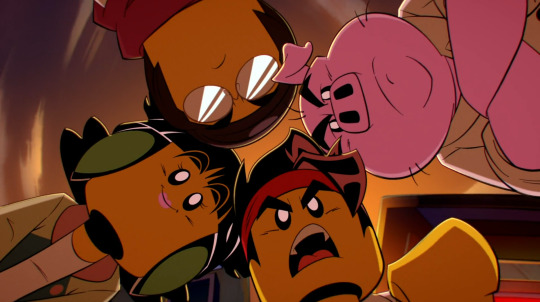
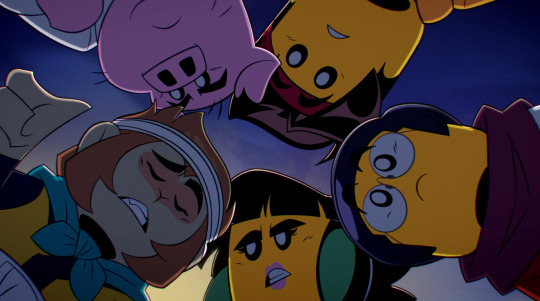
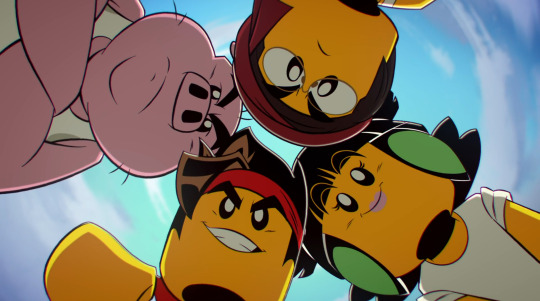
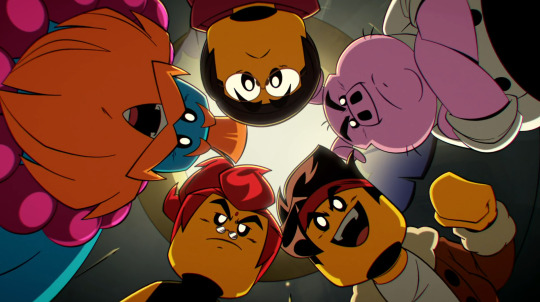
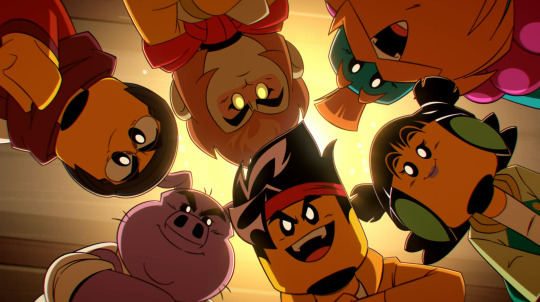
2x02 // 3x01 // 3x03 // 3x13 // 4x12
Team huddle!
#so funny that there are no team huddles in s1 because they didn't plan back then#And then for most of s4 MK is in denial that there should be a plan beyond ''get my friends!''#lmk#lego monkie kid#plan man#one day I'll make my post of every time they mention the word ''plan''#that'll be a long one#''How could you lead us into this fight without a real plan?'' ''We've basically winged it without a real plan!''#yeah#4x12 did so much for me personally#Me pre s4: oh yeah it looks like MK took on the role of planning especially after Wukong failed to do so#And even further back MK focused on developing this skill after 1x10 when he was worried about winging it with his friends on the line#''What's the plan monkie man?'' ''I don't know. Wing it?'' ''Yeah! Sounds great!'' ''No! I didn't mean you guys too!''#s4 special: Hold my beer#Me: REALLY????? YOU'RE BRINGING THIS TO THE FOREFRONT FOR MK???#no one else may care but lmk writers just know. I do#I care
773 notes
·
View notes
Text

She is offering water to any lost travelers! However, it's so hot that the water has become tea, so she's adjusted accordingly!
#neopets#neotag#neoart#kiko#slorg#aquanutart#this was for a western themed beauty contest last year! it was very fun! :D i'm so happy we were able to be part of it!#and by 'very fun' i mean it's completely exhausting and i can only handle participating once or twice a year#but it is very exciting too! she gave tea to everyone who stopped by. she was very happy to be able to help so many visitors!#i actually forgot until i checked whether this was from one or two years ago... my sense of time as an adult is --- *waves hand vaguely*#i'm so sorry for all the messages i didn't answer. specifically to the user who sent me a really kind message out of the blue#about how they got the slugawoo avvie from my quiggle's lookup. i didn't even know you could get the avvie from his lookup#so i was very happy to find out!! and i was happy there might be more people getting the avvie from his lookup i didn't know about#and i wanted to tell them how absolutely happy it made me and my brain said ' you should respond to this right away or you won't do it'#and i thought you fool. of course i'll make sure to do something this important#and i kept thinking about it for the past year and thinking i will do it. i will do it#but when i thought about writing the words that were floating in my mind the whole time i would feel blocked#this happens all the time and i'm sorry. it really does make me so happy#and then they deleted all the neomails but thankfully i had it saved so i still was able to find their username and send a message thankyou#i'm very glad
130 notes
·
View notes
Text
There needs to be a scientific study done on how Rockstar Games' Arthur Morgan is able to provoke the most earth shattering emotions I didn't even know I had in me
#you guys get me right#like you feel it deep in your chest#the joy the anguish the grief#it feels like words aren't enough#and I don't mean it as in “sad moment in video game makes you sad”#I mean it as in “a deep and well written moment that has been slowly building is fleshed out in a video game and I think about for weeks”#when I say I lose sleep over this game I really mean it#I spend hours just laying in bed thinking about everything that happens in arthur morgan's life#it eats at me#I'm not ashamed of how much I have cried over this game#it fucking gets to me#playing rdr2 is the best form of escapism until the story hits you like a stab in the chest but the blade just pushes in further and further#until you're left with a gaping wound#“wow michael I didn't know you were so emotional over pixels on a screen”#except those pixels were acted out and performed by real people and voiced by real people and designed to look like real people#the game's main target was historic realism emphasis on REALISM#to provoke emotions through amazing storytelling#it's okay to feel strongly about things!!#this game man#this game#rdr2#red dead redemption 2#mick squeaks#mick thinks#arthur morgan#red dead redemption 2 spoilers
255 notes
·
View notes
Note
Can you talk about trans!Curly a little bit more? I'm curios if you have any headcanons and the like
-💀
It's just such a thing in my mind because it adds a truthful sadness and differing aspect to mouthwashing.
If Curly was trans it adds the horror of the horribly selfish thought he could have easily been in Anya's situation. It could've been him but it wasn't and he so conflicted on the pit it put in his stomach that brings and the shameful relief it wasn't. In this scenario he is friends with Jimmy for a long time still. Jimmy likely knew him pretransition. Maybe he gave Curly weird looks then, maybe they never stopped after, maybe they seemed meaner. They are guys now, bros, both of them are. He doesn't really have to worry what those looks mean anymore, Jimmy just has that face with him sometimes. It's recontextualizing a lot of things for him that he was in denial about or too ashamed to admit. How naive he was being and how he let that get another person hurt.
Specifically with Anya, it's he knows the dread and fear she's feeling. He can understand it because he had to live with it for a good portion of his life, he knows it cause he still does, just in a slightly different way. It makes him think of all the times he's been alone with Jimmy, all the times he's been way more drunk off his ass and not remember the night, Jimmy was always with him the next day. Makes him think of the comments he would laugh off both because that's what guys do but because that part of being a girl says to laugh so Jimmy doesn't do something. It's the selfish realization that he was never safe and he's uncertain now too. Mad at himself for forgeting that feeling, espcially since for a long time he would've been considered the only woman on a crew (with all that implies) for a long time.
He should've taken those blinders off, step back into that position for just a moment and it's so much more painful that Anya likely came to him because he should've gotten it. Those thoughts don't leave his mind after the crash when he's in an even more vulnerable position than she was...
#this is less headcanons and more my thoughts of the intersectional horror this brings to mouthwashing which is also a thing it#already has but more directly in the mix vs just the class gender and positional struggle. like the idea he waited to confront Jimmy becaus#he could conceptualize the crime better because of experience with womanhood and also how it would've destroyed him in terms of being trans#like its weird to word as a comparison but thats kinda how empathy works as in an understanding and ability to project through aspects#like you found out your friend who has always had weird feelings about and relating to you is a rapist and got one of your other friend#pregnant and is now being openly hostile and aggressive towards you. You have only a few days to really think on all of this all the years#with him and how many oppurtunites he had that you blame yourself for giving him both in life and to do to you. You are starting to#realize that he may have done what he did to Anya because it was no longer viable with him or because of weird transphobia/homophobia#from Jimmy and god its so much and he should've know better and what did Jimmy do then - c r a s h#he is at such a small amount of mercy to Jimmy now and he can't protect Anya and it's terrifying because i know and you know that Jimmy is#giving him those weird looks again...#like it adds another layer of horror to things and while I don't think Jimmy would do anything to Curly it's heavily implied he targeted he#because of relatively more important position and getting Curly to have doubts about him as a power play and Curly knows Jimmy well enough#that him immediately exerting his authority and power would set him off after already having been mad about it and even when doing#damage control it still set him off. like its the horror of accidenlty siding with your oppresser and hurting other like you only to then b#stabbed in the back again by the person who took advantage of your nature like its so complext but my actual trans curly headcanons#are just a little bit happier like i imagine he was the first on the boys soccer team and a star player. maybe he and jimmy even picked ou#his first offical “boy” clothes and Jimmy picked most so he looked like the grungiest white boy but she was a boy so it didn't matter cause#it was with his friend who accepted him and I bet on the bed he looks back at all those moments and notices the little details that his#friend wasnt actually so happy but he can't be certain when he started looking so bitter or hes just imagining out of paranoia cause he jus#cant know and even if he could he wouldn't want to ask like god thinking about Anya and probably being a little glad if not heartbroken#that she did get out of it in the end like trans curly and anya destroy me even more its so upsetting like he didn't realize how much he go#you girl and waited to act like it was cowardice but then would she not realize what hes realizing? should that be a grace or more of a#condemnation in her mind like what are her thoughts? espically during the scene Jimmy hits Curly like she had to hear and what did she thin#they are tormented in a similar hells with the same demon and its fascinating#mouthwashing#mouthwashing game#anya mouthwashing#curly mouthwashing#jimmy mouthwashing
85 notes
·
View notes
Text
Thinking about the song "Ship in Port" by Radical Face and clones
Thinking about the line "Farewell to the chains we were born into" and what that can mean for the clones

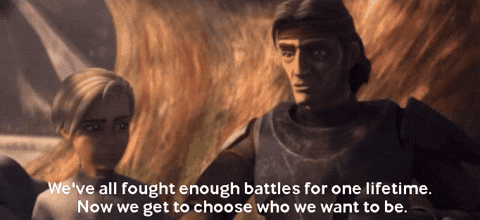
Thinking about how "But I have always stayed in place/Under that old illusion that it's safe" could equally describe Hunter, Echo, and (s1+2) Crosshair's complete opposite approaches to the Empire and post-war life.
The way Crosshair clings to his identity as a soldier of the Empire
And Echo as a soldier of the Republic
But Hunter puts his identity as a soldier behind him
Crosshair fights for the Empire to gain purpose
Echo fights against the Empire to save his brothers
And Hunter decides the Empire is too strong to even try to oppose
"A ship in port is a safer one"

"but it's not the reason it was made"

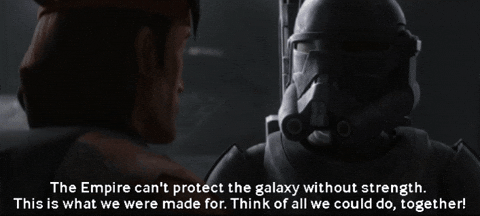
"So forgive me if I wander off"

"And forgive me more if I just stay"

Thinking about what The Bad Batch could have been if it had more fully explored the differences between those ideologies
(Thinking about what The Bad Batch could have been if it had dedicated more screen time to the 'reg' clones within the Empire and the underground network's fight to free them , instead of just sidelining Echo and Rex for a hypothetical clone rebellion show we might never get)
#i have lots of thoughts and many draft posts in which i've been struggling to figure out how to word those thoughts#tbb had SO much potential#it was so close!#it really could have been on par with Andor if it has just tried#i feel like i'm projecting these themes that aren't really there#the pieces are there the show just didn't focus on them#i considered saying hunter 'hides from the empire to protect his family' but that never included crosshair just omega#so that felt like giving him too much credit#ignore the music video i just really love the acoustic version bc MMM that viol!#the rest of the lyrics totally fit for clones of this era too btw#like SO WELL ugh#if i had the time resources and attention span I'd make a music video#maybe someday...#(lol i have waay too many projects stuck in my brain and also the new semester started and i'm already so behind rip)#while we're on the subject of radical face and clones#“always gold” is THE perfect heartbreaking Kix song!#tbb#tbb analysis#sw tcw#tbb echo#tbb hunter#tbb crosshair#arc trooper echo#the clones#radical face#bardic musings#sorry i didn't credit the gifs#this has been in my drafts since long before i knew people care about that and i can't find where i found them from#just know the shitty ones are the ones i made lol
83 notes
·
View notes
Text
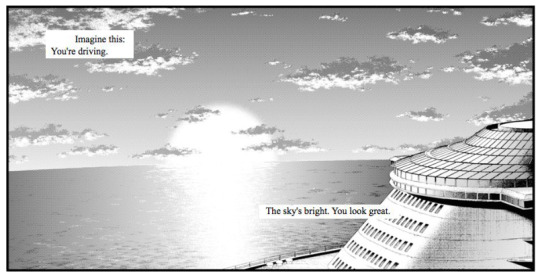
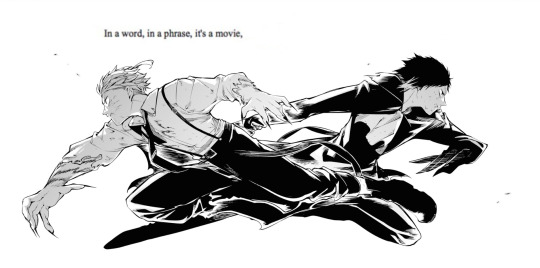
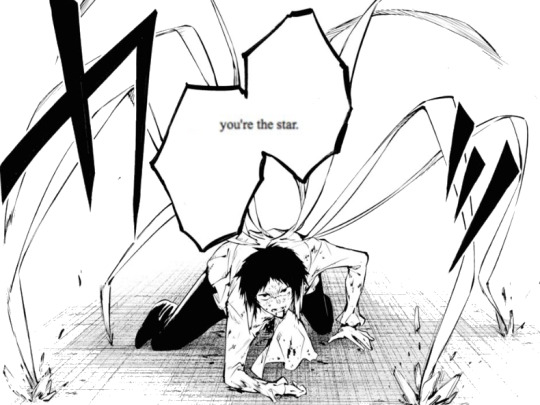
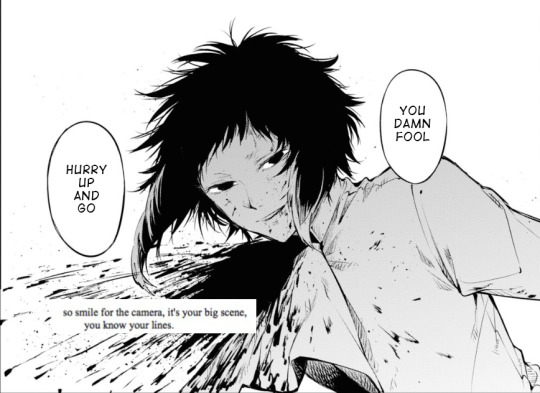
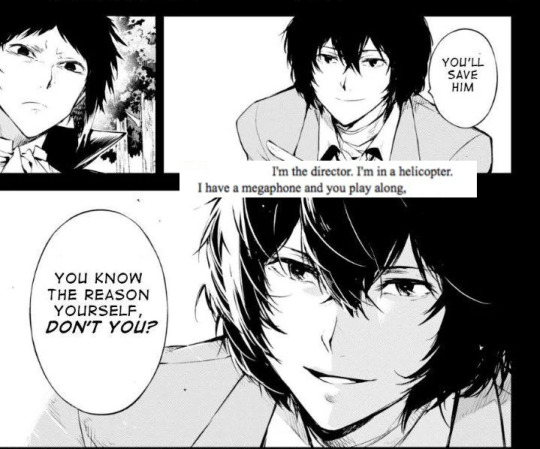
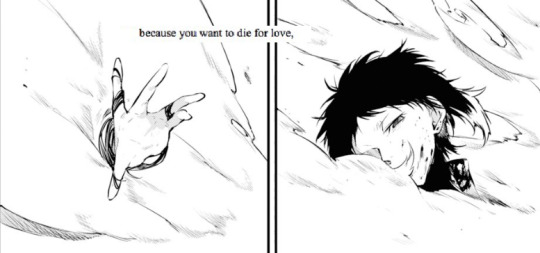
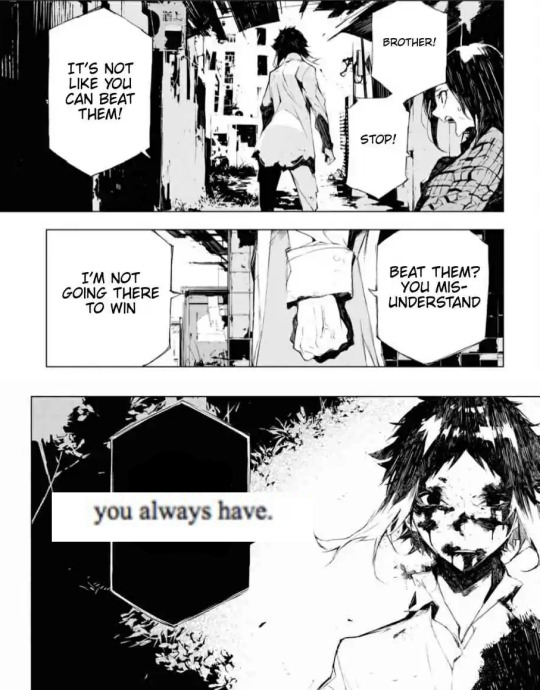
planet of love
#bsd#bungo stray dogs#akutagawa ryuunosuke#ryuunosuke akutagawa#shin soukoku#sskk#uhmm excuse the fact that the quality on the word fragments is a little bit shit if you look too close#i didn't wanna type it out so i just cropped the lines out of a pic of the poem but obviously that kind of zooming in#doesn't preserve a clean image. i think it looks mostly fine but it could be better#anyway. had a hashtag Thought. do you guys get me#smth smth how we only really see aku express the fact that he cares via being willing to die for people#however the very interesting contrast between “accepting he's going to die for REVENGE for his lost friends”#vs. you know. dying for atsushi to PROTECT him. no vengeance. atsushi is ALIVE and aku dies TO KEEP HIM ALIVE. idk#the difference between protection and vengeance but both times it's love expressed as the intention to die IDK IDK IDKKKKK#DO Y'ALL GET ME#oh btw poem used is planet of love by richard siken. i think we here all on the sad gays website know that already but just in case
227 notes
·
View notes
Text
MASSIVE SPOILER for one of the endings.
it's been a while since i tried looking, but i did hear that something like this happens last year and over time started to think, "was it a fluke?" bc no one posted footage or caps of it then, and i aimed for a completionist run in my first playthrough. turns out it's real! and definitely shines a new light on a character that, for most other types of playthroughs, will not give this much emotion! EDIT: transcript now included, and some stillshots under the cut
[0:28] Marie: Henry, this is the man who kept you from doing the right thing tonight. Kill him. [0:15] Forrest: Henry, you don’t have to do this. If you’ve not killed anyone yet, there’s still time to make the right decision. [0:05] Out of shot: (Gunshots) Henderson Police! Freeze! Marie: No! Henry, get out of there!
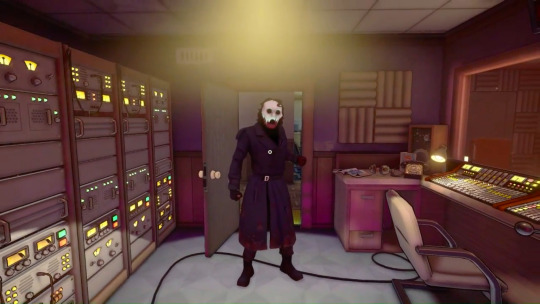
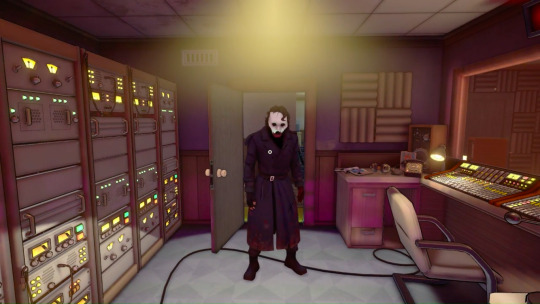
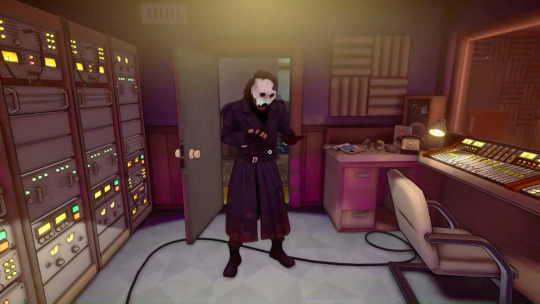
#killer frequency#henry barrow#these hands………#so yes MORE spoilers and further commentary ahead here in the tags:#yes this is a fairly tragic ending if you already know how to get it. but again TERRIFIC VOICE ACTING BEFOREHAND AND AFTER.#feel free to reply in post if you want to ask about that part.#i didn't include that in the vid bc it's so visceral and raw but i love their performances. that shit hit hard dang.#but i want to ask anyone if their perspective on henry changes after seeing this? mine does tbh. i didn't expect a possible show of remorse#like at most hesitation! but bc of the context of forrest's dialogue- does it lean into remorse? a large definite shift in his mind!#even if he Has killed already then he's still taking forrest's words to heart and reconsidering everything which DAMN-#-my videogamey headcanon of forrest's character stats showing his Persuasion and Charm MAXED OUT is pulling tf through here!!#also can anyone reply re: would forrest's dialogue change but he still survives if henry kills maurice or murphy? or would forrest die?#and if the devs Actually gave henry other official kills in the game but didn't disclose them in the narrative- then is this the test?#like if henry kills AT ALL in game even though the player isn't privy to knowing which victims are his then is this ending unattainable?#also placing this scene/character moment behind THIS ENDING SPECIFICALLY heck that's cold. dang fellas.#going to eventually pull out a hc i've been holding back for a long time in a later post and i'll mention this scene again then-#-but this part in particular as well as another “easter egg” has really put more fuel to it
150 notes
·
View notes
Note
For the writing prompts;
19. For luck - Rom and Leeta
"And then," Bashir was saying - though in truth, Rom was paying only half attention, far too busy thinking about Leeta - "she came right up to me, and kissed me on the lips!"
"Oh, she did, did she?" Chief O'Brien said, scoffing good-naturedly.
"It's true!" Bashir insisted, though he didn't look insulted by the Chief's doubt. He was smiling into his glass, seeming quite delighted by the disbelieving frown on O'Brien's face.
Rom didn't quite understand what was supposed to be so 'unbelievable' about the story. In fact - "It seems pretty believable to me," he said. "Doctor Bashir's always kissing beautiful women." (Including, at one point, Leeta - though not anymore, Rom thought with some pleasure.)
"Yes, but this one was out of his league," the Chief said, batting his hand playfully across the table.
Bashir just smiled bashfully, ignoring the swipe. "Ah, well. You're right about that. She wasn't really interested in me after all. Turns out, she'd just misconstrued the human concept of a 'good luck kiss'".
"Ohh! A 'good luck kiss'!" Rom said eagerly. Then, after a pause, "Uh, what's a 'good luck kiss'?"
The Chief sat back, idly crossing his arms. "Well, it's pretty much exactly what it sounds like. It's a kiss that you give someone to wish them luck."
"Oh," Rom said, considering that. Luck was always a good thing to have. Perhaps... "Oh! Leeta!" He stood, sending his chair clattering backwards. "I'll be back!" he shouted, then raced from Quark's bar, ignoring his brother's parting shout out dismay.
He needed to find Leeta.
--
"Leeta! Waaaait!" Rom hollered, shuffling through the crowded promenade as quickly as he could manage, chasing after her familiar voice. "Leeta! I need to give you something!"
This would be easier, he thought, if Bajorans could hear as well as Ferengi could.
But, at last, Leeta stopped, turning to find him. "Rom? Rom, what's the matt-"
The rest of her sentence trailed off into a hum as Rom reached up, pulling her down to plant a kiss square on her lips. One of her hands cupped Rom's cheek, soft. Rom didn't really know how long a 'good luck kiss' was supposed to last for - he really should have gotten more details before running off (for example, does it need tongue? Bashir never specified.) - but he thought that this should satisfy it.
He pulled away, grinning toothily up at his wife. "Hi, Leeta," he said.
She smiled down at him, cheeks flushed and lovely as always. "Hi, Rom. What was that for?" she asked, looking bemused and delighted.
"It's a kiss," Rom said, perhaps unnecessarily. "For luck," he added. "It's a hoo-man tradition!"
"For luck? Rom," she asked, laughing, "what are you wishing me luck for?"
Rom blinked. "Uhhh... For your day?"
Leeta beamed at him, and then leaned down, pressing a kiss to his forehead. "Well, I think it worked. I do feel pretty lucky now."
Rom grinned. "Me, too."
--
(also if anyone else wants to make a request, the ask game is here. i can't promise they'll get done as quick or be as long as this one is, though!)
#quark: a 'good luck kiss'? oh he won't feel so lucky when i get my hands on him! throwing around my poor chairs like that...#i did my very best to get rom's speaking voice right. he's such a fun guy#somehow he has not yet appeared in my one long ds9 wip so i have not ever written him before#man i wish i could write my ACTUAL fics as quickly as i wrote this guy. i mean it's only 500 words but still!#i think i am too picky about them. this thing didn't have to be fully formed tho which makes it easier#and this is probably longer than i should have made it because i love rom and i am incapable of restraint#also i got excited about rom so these prompts are not being written in the order they were sent lmao sorry#amusingly of the ships i was sent this is the only one that i've even really posted or reblogged about before lmao#i will be wading into uncharted waters (for me) with the other two#star trek#ds9#star trek ds9#deep space nine#rom#ds9 rom#leeta#rom x leeta#god i don't know how people tag their ship. do they have a ship name??#julian bashir#miles o'brien#ficlet#my fic#ask game#ask answered#romleeta
37 notes
·
View notes
Text
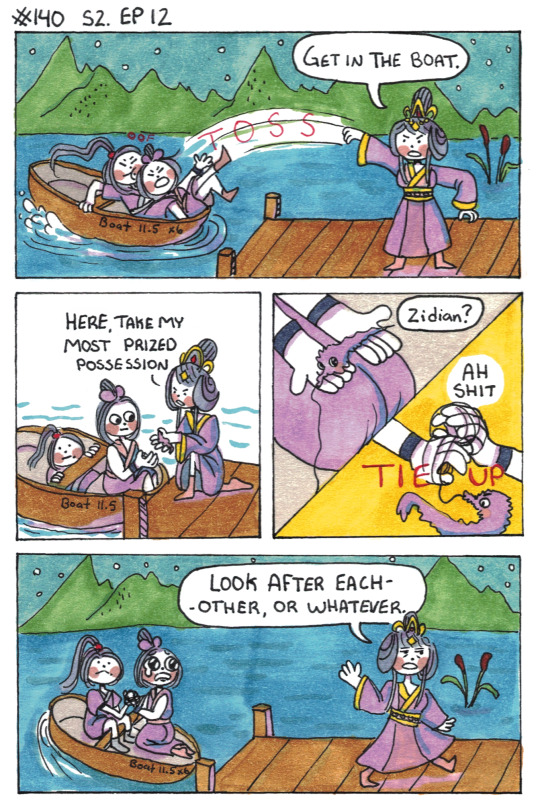
Don't Wormy About Me.
[First] Prev <–-> Next
#poorly drawn mdzs#mdzs#jiang cheng#wei wuxian#yu ziyuan#Please allow me to make it clear how important I think the hug between YZY and JC is in regards to several aspects of their characters#For one - it is the resolution and reveal that behind all the harsh words and bitterness...She really did love her son.#A hug is a soft gesture that you would never expect from someone like YZY and the fact she shows JC this affection now -#-Tells us how she knows that this upcoming battle is a death sentence for her.#Her giving away Zidan is honestly overkill but another sign of her truly showing him how she loves him and wants him to survive.#The dread of knowing she's walking back to a fight without zidian and trying to keep up brave face one last time...chilling.#Zidian represents legacy and promises. And this is going to both save and destroy Jiang Cheng as he carries this weight alone.#Heartbreaking stuff! Didn't draw it in the comic because I wanted to draw a silly worm on a string!#WWX tried to help JC out of the knot but got stuck in it.#Those worm on a string tricks are harder than they look!#Also; it's been about a year since the last boat joke - but indeed this is the 11th boat of pd-mdzs. No need to do the math.
1K notes
·
View notes
Text
guess who's still thinking about Lucifer >.<
anyways thought it'd be fun, given my previous post about his dissociation with conversations, to try and guess what his takeaways were from his phone call with Charlie based on his reactions
Maybe I'm wrong about what he's catching and what he's missing but either way I had fun
strike through= what he missed bold=what he caught neither bold nor strikethrough= he might've heard it/made it out through the white noise, but not enough to connect the dots RED= only heaven is in red cuz you cannot convince me otherwise that that's not a trigger word for him
Idk thought it’d be fun to try and guess what Lucifer is ACTUALLY hearing with his dissociation filter on let's GO
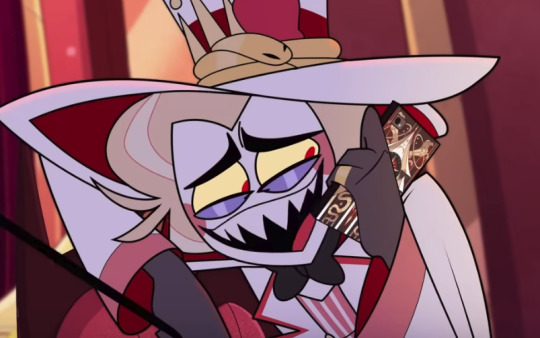
Lucifer: [insert absolute fail of hello]
Charlie: Hi Dad! Lucifer: Hey! How are ya? Oh! Wh-wh-where are you these days? Charlie: You know where I am, Dad… I’ve told you before…
Lucifer: You hAve? Oh. yeah Uh, erm well I um uh
Charlie: I told you when you called me five months ago! Or did you not listen?
Lucifer: No no no just forgot! I just forgot. I’ve been really busy with you know… um. iMpOrTanT tHiNgS
Charlie: Well I’m actually running a hotel to rehabilitate sinners, maybe you saw our commercial?
Lucifer: No? Sadly I… missed it! Lucifer: You know I haven’t been watching much TV lately! Scrambles the brain! Lucifer: but hey! A hotel! Fun!
Charlie: Listen, Dad, I’ve got kinda… a big ask?
Lucifer: -spit take- Yeah?! Of course! Anything in my power is yours for the asking you just name it
Charlie: I need to speak to heaven! Well, whoever’s in charge up there above Adam above anybody, I need to go to the top!
Lucifer: NO Lucifer: no no no no Lucifer: That’s uhahah no…
Charlie: Look! Dad! I don’t ask you for much. I never have, but this-this is really important to me. It’s the most important thing I’ve ever done and I… need… you… I need your help
Lucifer: I-... I don’t know Charlie
Charlie: Please just- Come see what I’m trying to do. You’ll see why it’s a really good idea and heaven is bound to agree if I get the chance to talk to them
Charlie: Please dad
Lucifer: wait… you’re… INVITING ME OVER??? Lucifer: ABSOLUTELY Lucifer: I’LL BE THERE IN AN HOUR
___
so yeah, he can semi follow along but like crucial bits and pieces ARE being left out
#lucifer#lucifer morningstar#hazbin hotel#dialogue#dissociation#this has been on my mind since the episode aired tbh#I think in the notes of my last post (I am not finding it for the life of me ;-; If I do I'll do an edit and credit them)#someone was talking about how this could also be nervousness as well#and you know what#yeah absolutely true#nervous about talking to his daughter#and the dissociation absolutely doesn't help#so nervous about navigating a conversation too#I do not think I'll do the whole episode#I really just wanted to explore the phonecall tbh#but legit I'm convinced when Charlie introduced Vaggie#all he heard was “-aggie!” and just defaulted to the only name he could think of that ended like that#tbh he's probably missing chunks of words and has to figure out what the word was based off of prefixes/suffixes#cuz that clearly happened with Vaggie#but it's already a challenge to piece together what he DID hear and what he didn't hear#so imma leave it at this#lowkey this is giving me loads of writing ideas for my own stuff
315 notes
·
View notes
Text
Hey, something you should know about days of music -
See these boxes on the second floor in the music shop?


They have spells that cost 1 candle. One is 3 shared memories, and the other one is a RANDOM INSTRUMENT SPELL

Why is that such a big deal?
You have a chance at getting a spell of an ULTIMATE GIFT INSTRUMENT.

I was shook because that happened to a friend last days of music event and didn't know if they were going to bring those spells back
Only can buy one of each but I think these spells will refresh everyday possibly. Will update post tomorrow if that is the case...
UPDATE: They refresh WEEKLY apparently which is kinda a bummer if they disappear after the event because you will only get like 2 instrument spells however if they stick around after event I will be happy so will update post again after days of music.
UPDATE 2 (after event): the spells are gone. ;-;
#sky children of the light#sky cotl#abyss's sky screenshots#that sky game#days of music#making this post because a bunch of people in game didn't know about it and I must spread the word around#I really want the original handpan as a spell#you have no idea how bad#also yes I have a spell hoarding problem it comes with playing the game almost every day for 3 years
43 notes
·
View notes
Text
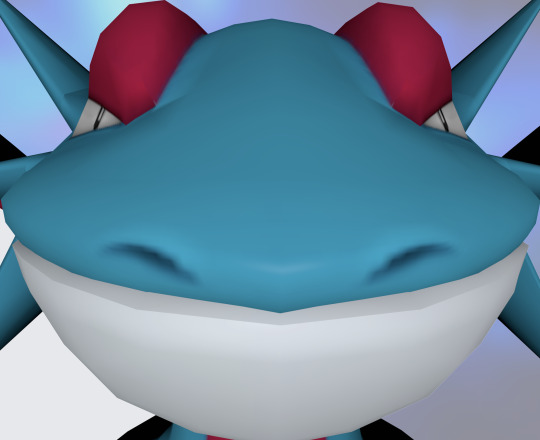
#salamence#THIS one is a good one. someone else mentioned the chin and claimed they look like lord farquaad. and would say “why YES this is Divine” and#i didn't like how accurate that was. anyway dragon/flying 4x weakness to ice my belovèd. if anyone says ice is bad#keep in mind how much of the competitive landscape it totally nullifies. ice is like. probably my second favorite type. behind electric#even though none of this is about salamence. they've got the whole primary colors thing going on but minus yellow#red and blue. red white and blue. american pokémon? big red wings that're just Flat. i really dunno what's happening here i just know it's#supposed to be really good in competitive. and also they got a paradox form which i Guess TPC is trying to market as totally new unrelated#pokémon but i'm always going to call them “paradox hariyama” and such instead of ~iron hands~ or whatever they're supposed to be called#don't want my pokémon names to have two words in them……
692 notes
·
View notes
Text
Okay, finally caught up on the full VOD and here are some messy thoughts
...
So. UHHH. On a gut emotional level, I fucking hated that lmao. Whole chapter of my life finished with a bang and a whimper. Las Nevadas Labor Union is over, y'all. The boss just deny, defend, deposed himself. Holy shit.
On an intellectual, thematic level... I... can't really... argue with that? Like, we didn't actually expect a character that cc!Q explicitly said was inspired by Walter White to receive a happy ending or a functional relationship, did we? We were really high on our copium supply, good grief.
I could, and still might, write a whole meta about how c!Quackity has been passively suicidal with a foreshortened sense of future for a very long time. As far back as Doomsday, he didn't care if he lost his life, as long as he got to watch those who hurt him go down first. He declared so many times that he would die with his country. He was incessantly compared to c!Wilbur, both by other characters and by the narrative itself. He was fucking terrified of being betrayed again, but he always expected it, and moreover did nothing to prevent it. He told c!Foolish and c!Purpled outright that they would have every right to kill him for what he did to them. Didn't even consider making himself immortal with the revival book, instead focusing on making sure c!Dream would no longer have it. Didn't fight back when Slime killed him. Doubled down on his mistakes, and in hindsight rationalized everything as inevitable. Wrested back control the only way he knew how, following another's model. Las Nevadas was a broken institution, built by a man who had given up on fixing anything. His story was always about the self-perpetuating cycle of power and abuse.
This... isn't shocking, unfortunately. If anything, it was too obvious an ending.
I won't go too deep into the OOC implications, because they will make me sound... way more parasocial than I want to be. But I don't think it's controversial to say that the DSMP holds a lot of complicated, difficult, bittersweet memories for many of its former members. It does not surprise me at all that the ending cc!Q chose for his arc was an unhappy one. There are several possible conclusions I would have greatly preferred, but none could have realistically happened without Certain People returning. I wonder how aware the creator was of that, and how much those emotions bled into the writing.
And while I'm... still not certain how I feel about c!Quackity blowing himself up even after being given a second chance (I will always prefer "live and try to do better" à la Bojack Horseman for characters like this), I see the in-universe logic behind it, and everything up to that point was completely in character. Right down to his denial of having ever done the deed, boasting that his enemies deemed him important enough to kill, while ironically taking hollow pride in denying them the chance to take the revenge he so desperately sought for himself, showing no mercy to who he maybe subconsciously believed was his greatest obstacle to true glory... ughhh, c!Quackity makes me so fucking SAD you guys-
Ahem. Anyway. Could he have forgiven himself? Would he have ever accepted the forgiveness of others? Perhaps, perhaps not. In two other lives, those he unknowingly gave a second chance to, he did. q!Quackity went on living for the sake of someone he loved, knowing he, too, was loved. k!Quackity went on living until he found justice, knowing he did not deserve to be wronged. c!Quackity... what other legacy would he have left? Does he know what he truly wanted, before all that fear and hunger for control tainted his heart? Was he content to know someone would remember him with a shred of fondness? That he left a single positive impact? That his life did have a purpose?What if he knew that even some of those with the most reason to hate him still wanted him to be better?
I suppose one might imagine an open-ended resolution, exchanging that last shot of c!Q's last life vanishing with him riding Boner/Ossium away from the explosion and into the sunset to build a better legacy. What would that new legacy look like? I have no idea. I don't think he knows yet, either. But we can pick our favorite based on the day. Time travel is real, and canon is made up. We can do what we want forever now. Enjoy.
...
He's not a fucking gringo, though. c!Quackity is Mexican, importantly so, full fucking stop. Stop infecting him with more Trump particles than he already had. "Oh great, a foreigner" honestly FUCK you Alex. 0/10 for that
#i have not written any dsmp analysis in so long#didn't even realize how much i missed this. how much this character really meant to me.#i feel... fuck. i wrote hundreds of words about how i feel and i still don't know how i feel.#thank you quackity from las nevadas... for rekindling my inner english major lmaooooooo#dsmp#c!quackity#tw suicide#analysis
38 notes
·
View notes